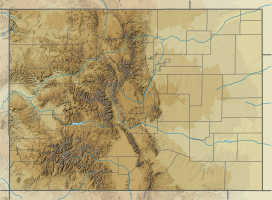Tower Mountain (Colorado)
| Tower Mountain | |
|---|---|
 Tower Mountain (left) and Macomber Peak (right̟) rise above Silverton | |
| Highest point | |
| Elevation | 13,558 ft (4,132 m)[1][2] |
| Prominence | 1,652 ft (504 m)[2] |
| Parent peak | Niagara Peak[3] |
| Isolation | 4.88 mi (7.85 km)[2] |
| Listing | |
| Coordinates | 37°51′26″N 107°37′23″W / 37.8572185°N 107.6231159°W[4] |
| Geography | |
| Location | San Juan County, Colorado, U.S.[4] |
| Parent range | San Juan Mountains[2] |
| Topo map(s) | USGS 7.5' topographic map Howardsville, Colorado[4] |
| Climbing | |
| Easiest route | class 2 hiking[3] |
Tower Mountain, elevation 13,558 ft (4,132 m), is a summit located northeast of Silverton, Colorado.
Description
[edit]Tower Mountain is located six miles (9.7 km) west of the Continental Divide in the San Juan Mountains which are a subrange of the Rocky Mountains.[2] Precipitation runoff from the mountain drains into tributaries of the Animas River. Topographic relief is significant as the summit rises 3,750 feet (1,140 meters) above the Animas River in two miles (3.2 km).
Climate
[edit]According to the Köppen climate classification system, Tower Mountain is located in an alpine subarctic climate zone with long, cold, snowy winters, and cool to warm summers.[5] Due to its altitude, it receives precipitation all year, as snow in winter and as thunderstorms in summer, with a dry period in late spring.

See also
[edit]References
[edit]- ^ The elevation of Tower Mountain includes an adjustment of +1.796 m (+5.89 ft) from NGVD 29 to NAVD 88.
- ^ a b c d e "Tower Mountain, Colorado". Peakbagger.com. Retrieved October 22, 2014.
- ^ a b "Tower Mountain - 13,545' CO". listsofjohn.com. Retrieved July 2, 2023.
- ^ a b c "Tower Mountain". Geographic Names Information System. United States Geological Survey, United States Department of the Interior. Retrieved October 22, 2014.
- ^ Peel, M. C.; Finlayson, B. L.; McMahon, T. A. (2007). "Updated world map of the Köppen−Geiger climate classification". Hydrol. Earth Syst. Sci. 11. ISSN 1027-5606.

